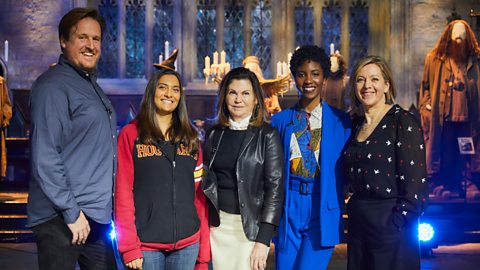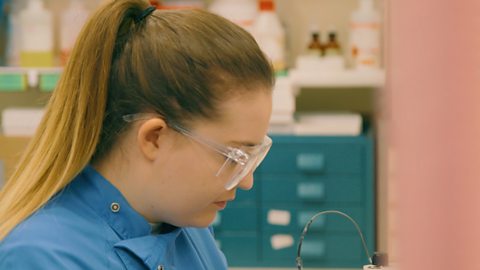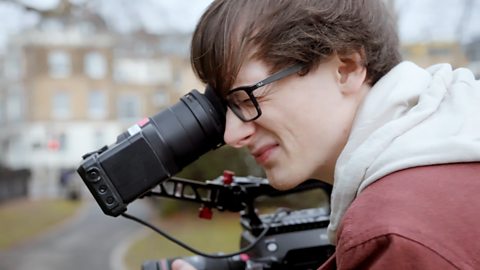Asian Network's Big Comedy Night brings you stand-up laughs from around the UK, but what's it like to be on the other side of the action?
The Young Reporter team went behind the scenes of some popular BBC brands to find out which jobs go into making hit content.
Scroll down to hear from presenter Harpz Kaur, comedian Tez Ilyas, radio visualisation team member Dan Lucas and producer Rumana Hoque about what goes into bringing Asian Network's content to life.

Harpz Kaur, presenter, BBC Asian Network
The best thing for me is the atmosphere in the room, it’s the reaction from the audience. That gives me more adrenaline to want to be on the stage and do what I do.
Harpz's top tip
If your instinct and gut are telling you this is what you want to do, I would definitely suggest getting all the experience you can.
Harpz Kaur
Hi guys, I'm Harpz Kaur and I present the Asian Network Breakfast Show as well as the BBC Asian Network Comedy Nights.
Clip of BBC Asian Network: "Welcome to BBC Asian Network Comedy in Edinburgh!"
That means I have to introduce every act that's on the line up, I have to do the fill in bits in between with my really bad jokes cosI'm obviously not a comedian. And then just really thank everybody for coming as well. And there's a lot of fun and banter along theway. It's a really cool job.
So there's a lot of hard work that goes into events like this. There's always a big team behind things that you don't get to see. You're in the audience laughing, having a little joke with your friends but really behind the scenes, you know, you'll have engineers who have to look after stage production and the way they want the screens to look, where everybody needs to stand, where people need to sit. There's a script that I need to learn so there's me backstage trying to revise everything and remember everything – the key points that I need to get out there and address to the audience.
The hardest job is actually for the content producers and editors that have to then clip all of this and turn it around for social mediaor for the website and, you know, getting the right soundbites and see what looks good, what doesn't look good, what's gonna work. There's so much to think about before you put something like this together.
So I think the best thing for me is the atmosphere in the room. It's the reaction from the audience that gives me more adrenalin to wanna be on that stage and do what I do.
My few tips for wanting to work in the world of media would be definitely have the passion for it. If your instinct and your gut istelling you this is what you wanna do and you wanna know more about it, I would definitely suggest that you get all the experience that you can. Honestly, I feel like what I'm doing right now is the best job ever and I wouldn't change it for the world and I'm so glad I went with my gut which was telling me to just go out there and do it. So if that's what you want to do, go get it!

Tez Ilyas, comedian
When I was going into my GCSEs I had the option between Drama and Business Studies and at that age I was like, "When am I gonna ever do Drama, am I gonna become an actor or something?" so I dropped it for Business Studies and I look back now and think, "What did you know kid?"
Tez's top tip
Write down your funny ideas, write down the funny things people say to you that you can turn into a joke later.
Tez Ilyas
Hi, my name is Tez Ilyas. I'm a comedian. You might recognise me from Man Like Mobeen. And today I'm here to discuss with you the fact that I've done BBC Asian Network's Comedy Nights.
If you told me at your age that I'm going to become a stand-up comedian, when I was your age, I'd have laughed in them people'sfaces like "Oh you're the comedian, telling me that I can become a comedian. What shall I just become an astronaut?!" But after I left uni and moved to London and I fell into comedy just completely accidentally – I found a stand up comedy workshop. From there I just started performing and eventually I could leave my day job and do comedy full time.
When I was at school I did the normal, traditional subjects of course, English, Maths, Science, History, Business Studies. You knowwhat, funny thing, when I was going into my GCSEs I had the option between Drama and Business Studies. And, at that age, I was like "when am I gonna ever do Drama like am I gonna become an actor or something?" so I dropped it for Business Studies and I look back now and I think "What did you know, kid, what did you know?!"
Clip of BBC Asian Network: Massive wedding mate. I'm like, cool! How many people are going to be there. This guy goes 'a hundred'. I'm like bruv, I have 100 people at Sunday roast in my family, innit. Like, what…?
The first ever BBC Asian Network Comedy Night I did was very exciting. I've done probably about four or five now. I remember thefirst time, I remember being a bit nervous but when we got there it was really, really fun. We were backstage, we were chilling, all theperformers were chilling out together, you know giving each other that sort of "oh you're gonna be alright" or "you're really funny,you're going to be OK" motivating and hyping each other up and that. But, yeah, I would say that even when you get big opportunities in your career in the future, treat it like any other type of gig and you'll be less nervous.
One of the things that people always ask me is "what does your family think? Oh, you're an Asian guy, what did your family thinkabout you going into comedy?" Now, look, it's not the traditional route for careers for a lot of people watching this and it wasn't forme either, I understand that. I went to London because I got a proper professional quite glamorous day job, so that's what tookme to London and then I found comedy and then I was able to leave that job after I was doing comedy for enough time that I couldmake proper money from it. But what I would say is, you are in a position now where you can take control of your own creativity.
If you're interested in doing comedy, honestly, just start doing comedy. Watch other people's stuff. Presumably you wanna be acomedian because you like comedy, because you've seen other people doing it. Keep doing that. Write down your funny ideas,write down the funny things that people say that you can turn into a joke or something later. Nearly everyone has access to asmartphone or owns a smartphone. You can just start filming yourself or you can get your friends to start filming you. Maybe youwant to be the guy who films stuff. You don't necessarily want to be in front of the camera. Learn how to edit audio and video, it's so important. It's probably the biggest skill someone can learn in the coming decades and that and you are in a perfect position tocapitalise on that.

Dan Lucas, radio visualisation team
Back in the day in TV, maybe there were a lot more people doing individual roles but now we are kind of expected to be able to have all of these different skills.
Dan's top tip
Make sure you have lots of different skills. Learning how to edit, light and grade you can make yourself more valuable.
Dan Lucas
My name's Dan Lucas and I am working on the BBC Radio visualisation team. So, we look after all the visual side of the radio content. So, on the Asian Network Comedy Night, as it's going out on the radio, our team, we look after all the filming of it so then you can also watch it on iPlayer and on YouTube and on social media.
At school I was really into sports. I also really love like the artistic subjects and science subjects but this kind of idea of media and film we never even touched on that school so that came a lot later for me. I did go to uni and did Sport Science because I just thought I want to do something I enjoy. Uni was an amazing experience, but I did sort of realise as the course went on that Sport Science probably wasn't really for me in like a career. So, I applied for this BBC production trainee scheme. We had placements in TV, in radio and in digital. So, we learnt a huge amount very, very quickly. The production trainee scheme was really my way into this career.
The Asian Network Comedy at Edinburgh Festival is one of my favourite things I've ever worked on because it's like you're in the middle of this comedy festival, there's so much talent everywhere. We have a few hundred guests come into the tent, they'll sit down and then this is the kind of like exciting part of the show because then we go live, the red light goes on, everything's being recorded and as the comedians are performing, I'm out in the TV truck vision mixing so I'm deciding when to cut to a close up, when to cut to a wide shot, when to show the crowd. Comedy in particular is like a game of cat and mouse. You have to cut to the audience just when they're about to laugh because if you cut to the audience and they are not laughing, it doesn't look very good on camera.
So, in our team radio visualisation, we are very hands on. Back in the day in TV maybe there was a lot more people doing individual roles. But now, we are kind of expected to be able to do all of these different skills. So, once the show's over and you've got the footage it's then getting it in the editing system and you having to start editing it down. It's about kind of getting together with the editorial team, the bosses, the different people involved on the radio side and the visual side and then deciding, right, how can we make the funniest one hour that we possibly can?
My tips for getting into the media world are make sure you have lots of different skills. I think if you learn all those little skills on the way – how to edit, how to light, how to grade – you can make yourself much more valuable in terms of joining lots of different teams.

Rumana Hoque, producer, BBC Asian Network
One day we were going to the Edinburgh Fringe Festival and they asked me if I wanted to produce the shows and said: "yes, absolutely". That’s when I realised I was into comedy.
Rumana's top tip
Don’t be afraid to ask questions and just be really curious.
Rumana Hoque
Hi, my name's Rumana, and I'm a producer at the Asian Network. I've been at the Asian Network for a really long time. It's my firstjob out of university and whilst being there I've produced loads of different programmes and one thing I'm doing at the moment is the Asian Network Comedy Nights which is one of my favourite jobs of them all.
So at school I loved doing kind of your English and anything to do with writing and being creative. I hate maths, still can't do maths.In radio we do something called back-timing. Don't even go there with me because it makes me lose my mind! So, I got into the Asian Network when I was just graduated from university. Before then I was writing, I was working at radio stations, I was going here, there and just doing whatever in any type of jobs that I could do related to journalism and then one day somebody from the Asian Network called me up and said "Oh, we hear you're a freelance and would you fancy coming down and doing some shifts with us?" and that was it, really. And then one day we were going to Edinburgh to the Edinburgh Fringe Festival. And then they asked me if I wanted to produce shows out there, which I absolutely said yes to and that's when I realised I was really into comedy.
When we do the Asian Network Comedy Nights, my job is to find the comedians and then what I'll do is, I'll work with them, I work with the presenter and we'll script a few things. And then I'm also responsible for like speaking to loads of different departmentsabout how we're going to record it, what it's gonna look like and that kind of thing. And then we record the night and I alsowork with other teams to like make the iPlayer programme, and the Red Button programme and then the actual radio programmethat will go out on Asian Network.
So, if you want to get into Asian Network comedy or if you wanted to do something similar to me, my top tip for you would be get your experience. Go and apply, go and work in places. Do what you can, go and meet people, don't be afraid to ask questions and just be really curious. If you are into something, for example, I was really into comedy, then, totally pursue your passion. Go with it and go and learn everything about it and go and meet people who are in that industry and what you might be able to do like myself very fortunately is merge your job with your passions and bring them together.
Sometimes there aren't enough British Asian comedians who are in the spotlight, who are in the mainstream and bringing thosecomedians from wherever they are onto this stage, that's so exciting and so brilliant. And I want to do more of that.

Making the Magic: Inside jobs in film. collection
Are you spellbound by the Wizarding World films? Meet the people who work in the film industry and make the magic happen.


